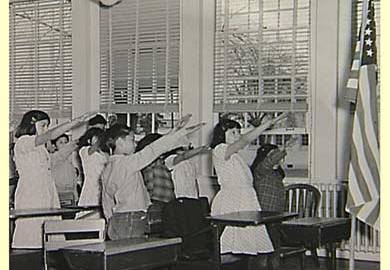California’s Loyalty Oath

I just had to sign a loyalty oath as a condition of my employment at a California state university. The California constitution requires all state employees to sign the oath. And I frankly find it offensive.
It’s not that I have any reservations about bearing “true faith and allegiance to the Constitution of the United States and the Constitution of the United States of America” or supporting and defending them “against all enemies, foreign and domestic”—although as a lecturer in a freshman class I won’t exactly be called upon to defend the state against its enemies or execute its laws. But I love my country and its Constitution as much as anyone. It’s rather that I object to being required to prove my loyalty to state simply to teach a class. I feel the same way about the Pledge of Allegiance—do children really need to swear not betray their country every morning before school starts? Is treason really a big problem among elementary school children?
California has required every citizen employed by the state to sign a loyalty oath like the one I just signed since 1950. Loyalty oaths like this are a product of McCarthy era fears of communist subversion. Teachers in particular were required to swear oaths that they would not indoctrinate students with communist ideas or incite them to revolt against the government. Of course, one person’s subversion is another person’s free speech. And oaths like this beg the question of what actually makes someone an enemy of the state. Is it treasonous simply to be critical of the government, or to argue that the Constitution should be interpreted differently?
Most people, of course, will tell you these oaths—as creepy as they may be—are just a meaningless formality. In theory, giving the oath falsely could earn you up to 14 years in prison for perjury. But in practice no one is going to get in trouble for violating their oath alone. It’s certainly hard to see how the oath could have much effect on how people discharge their ordinary jobs. Nevertheless, refusing to sign the California oath can get you fired. Most recently Marianne Kearney-Brown, a Quaker who was uncomfortable with the idea that she might be swearing she would fight to defend the state constitution, was fired from her job teaching remedial math at Cal State University, East Bay (she was later reinstated after receiving assurances that the oath could not require her to act in way that way that went against her religious beliefs). “I thought,” she told the San Francisco Chronicle, “if I’m going to sign it, I’m going to take it seriously.”





